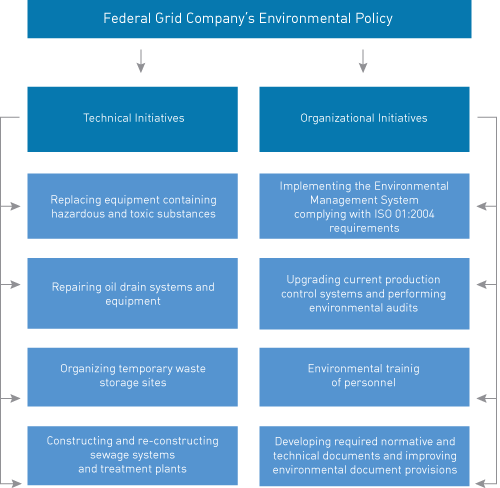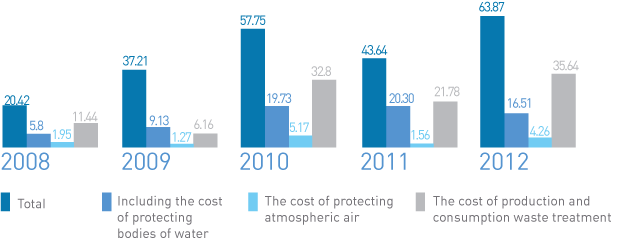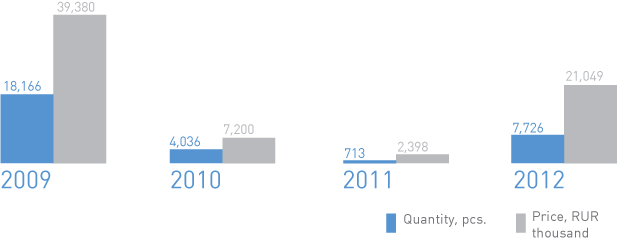- Federal Grid Company – Ten-year results
- Operations overview
- Social responsibility and sustainable development
- Financial performance overview
- Corporate governance report
- Share capital
-
APPENDICES
- Information on compliance with the FCSM corporate code of conduct
- Implementation of the assignments of the president and the government of the Russian Federation
- Information on transactions performed by JSC Federal Grid Company in 2012, recognized by russian federation laws as interested party transactions, and which are subject to the approval of the company’s authorized management body
- Audit Commission Conclusion on the Audit of Operational and Financial Activities of Federal Grid Company for 2012
- 2013 investor calendar
Environmental aspects
The Company is responsible in its approach to environmental protection issues. The Company’s approach is intended to heighten the level of environmental safety, and to provide for reliable and environmentally safe power transmission and distribution.
The Company operates in compliance with its own Environmental Policy, which includes technical and organizational initiatives intended to minimize the negative impact of the Company’s production activity on the environment.

The design of new facilities involves the development of special sections dedicated to environmental protection, that take into account all requirements of Russian environmental protection laws. The construction and re-construction of power grid facilities in accordance with the above-mentioned designs involves installing new environmentally-friendly equipment and implementing new technologies for laying and constructing power transmission lines.
In an effort to upgrade its environmental activities, in July 2012, the Company established a department to implement environmental policy. The new department will develop guidelines for the Company’s environmental activities, including: compliance with State policy and corporate requirements on environmental safety, and the implementation and operation of the environmental management system, as well as representation of the Company’s environmental interests while interacting with State authorities, non-governmental organizations and rating agencies.
The Company’s main activity, which consists of power transmission, is much less harmful for the environment, compared with other power industry sectors, as emissions, discharges and wastes are not the result of the Company’s production processes, occurring in the course of the Company’s production activities and being the least harmful.
In 2012, the Company’s negative environmental impact indicators were traditionally low:
- The aggregate volume of atmospheric emissions – 114.7 tons;
- The volume of discharge to surface water bodies – 88.34 thousand cubic meters;
- The volume of I-V hazardous class wastes – 13.3 thousand tons.
Nonetheless the Company does its best to further minimize the impact of the Company’s facilities on the environment, spending greater amounts to finance environmental initiatives in each coming year.
The cost of environmental protection initiatives implemented in 2008-2012, RUR million

The Stockholm Convention signed and ratified by the Russian Federation requires that polychlorinated biphenyl not be used in equipment by 2025. In line with Convention requirements, the Company is proceeding to implement a program for the disposal and replacement of equipment containing trichlordiphenyl, a highly resistant environmental contaminant. Such equipment is replaced as soon as it wears out, or during the re-construction and modernization of substations. The dismantled equipment is handed over for disposal to specialized organizations.
The price and quantity of equipment containing trichlordiphenyl handed over for disposal

2012 initiatives implemented pursuant to the Environmental Policy Implementation Program include the following:
- Repair of oil drainage systems and equipment at 56 substations;
- Organization of temporary waste storage sites at 188 substations;
- Re-construction of sewage systems and household and rain water treatment plants at 28 substations.
In 2012, MES North-West, a branch of the Company, successfully implemented an environmental management system. The system’s compliance with ISO 14001:2004 has been certified. Furthermore, a supervisory audit confirming the compliance of environmental activities with the above-mentioned standard was conducted at the executive body of the Company and also at MES South, another branch of the Company.

 square km
square km